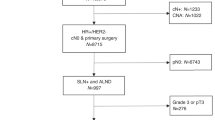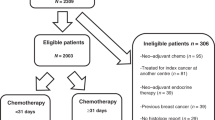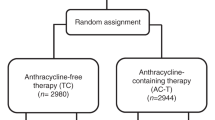Abstract
One hundred and seventy-eight patients with non metastatic inflammatory breast cancer (IBC) have been treated at the Centre H. Becquerel. Median follow up is 67 months (6-178). Every patient received neoadjuvant chemotherapy (mean number of cycles = 4; range: 2-8), followed by a loco regional treatment (radiotherapy = XRT or modified radical mastectomy = S), followed by adjuvant chemotherapy. During this period, the types of chemotherapy and locoregional treatment have been the following: Study I: 64 patients treated with CMF or AVCF and XRT; Study II: 83 patients, treated with either AVCF, FAC or VAC followed by S (n = 38) or XRT (n = 22) in case of complete or partial response, or followed by XRT (23) in case of initial supraclavicular lymph node involvement or lack of response after chemotherapy; Study III: 31 patients treated with FEC-HD + Estrogenic recruitment followed by S and XRT after adjuvant chemotherapy, except seven patients who received XRT (refusal of surgery). Although objective response rates (= 56.2, 73.5 and 93.5% for study I, II and III respectively) are statistically better in the 3rd study, this does not translate in dramatically different disease free survival (median = 16.7, 19 and 22.2 months respectively for study I, II and III) or overall survival (median = 25, 45.7 and 32.6 months respectively for study I, II and III). Analysis of subset of patients without supra clavicular lymph node involvement where neoadjuvant chemotherapy obtained at least a 50% response reveals a median disease free survival and median overall survival of respectively 38.3 and 60.1 months for patients who underwent S vs 19 and 38.3 months for those who received XRT (P = 0.15). These studies suggest that surgery has no deleterious effect on outcome of IBC. Advantage on disease free survival or overall survival from intensive chemotherapy in IBC remains to be proven with appropriate randomised trials.
This is a preview of subscription content, access via your institution
Access options
Subscribe to this journal
Receive 24 print issues and online access
$259.00 per year
only $10.79 per issue
Buy this article
- Purchase on Springer Link
- Instant access to full article PDF
Prices may be subject to local taxes which are calculated during checkout
Similar content being viewed by others
Author information
Authors and Affiliations
Rights and permissions
About this article
Cite this article
Chevallier, B., Bastit, P., Graic, Y. et al. The Centre H. Becquerel studies in inflammatory non metastatic breast cancer. Combined modality approach in 178 patients. Br J Cancer 67, 594–601 (1993). https://doi.org/10.1038/bjc.1993.109
Issue Date:
DOI: https://doi.org/10.1038/bjc.1993.109
This article is cited by
-
Inflammatory Breast Cancer—Comparing the Effectivity of Preoperative Docetaxel-Epirubicine Protocol to Conventional Antracycline-Containing Chemotherapy to Achieve Clinical Benefit and Complete Pathological Response
Pathology & Oncology Research (2011)
-
Concomitant intensive chemoradiotherapy induction in non-metastatic inflammatory breast cancer: long-term follow-up
British Journal of Cancer (2007)
-
Multivariate analysis of survival in inflammatory breast cancer: impact of intensity of chemotherapy in multimodality treatment
Bone Marrow Transplantation (2004)
-
Prolonged neoadjuvant treatment plus GM-CSF in locally advanced breast cancer: clinical and biological concepts
Clinical and Translational Oncology (2004)
-
Inflammatory breast cancer: Clinical progress and the main problems that must be addressed
Breast Cancer Research (2003)



